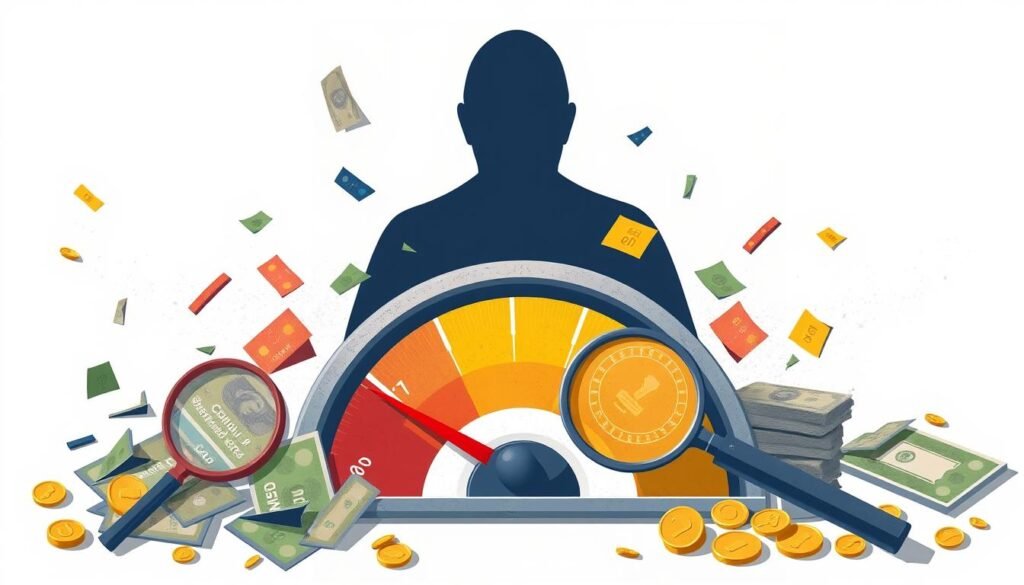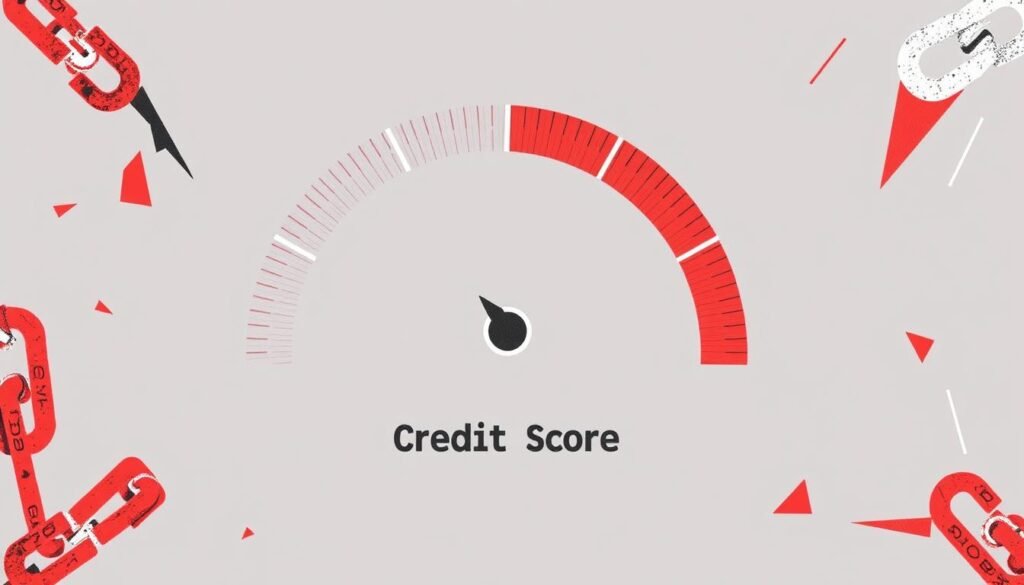Did you know a single hard inquiry can lower your FICO® Score by just a few points? It might seem small, but many hard pulls in a short time can really hurt your score. It’s key to understand hard inquiries to manage your credit and make smart money choices.
When you apply for a loan or credit card, lenders do a hard inquiry. This stays on your report for up to two years. Even though it doesn’t hurt your score as much after a year, it shows lenders you’re looking for credit.
Learning about hard inquiries helps you handle your credit score better. It lets you make wiser decisions about applying for credit. Let’s explore more so you know how these inquiries affect your money health.
Key Takeaways
- Hard inquiries can reduce your FICO® Score by up to five points, with effects lasting up to a year.
- Multiple inquiries within a short window (14 to 45 days) are often treated as a single inquiry by FICO® models.
- Hard inquiries stay on your credit report for two years but impact your score for only one year.
- Dispute unauthorized hard inquiries with credit reporting agencies to protect your credit score.
- Understanding credit inquiries helps in better managing your credit score and financial decisions.
What Is a Hard Inquiry?
A hard inquiry, also known as a “hard pull” or “hard credit check,” occurs when a lender checks your credit report. This is a key part of the credit application process. It helps lenders see if you’re a good risk for credit.
Definition and Importance
The definition of hard inquiry means a lender has looked at your credit report during a credit application. Unlike soft inquiries, which don’t hurt your score, a hard inquiry can lower it a bit. A single hard inquiry doesn’t hurt much, but many in a short time can really affect your score.
Hard inquiries stay on your credit report for about two years. They hit your score the most in the first year, then lessen over time. Lenders use these inquiries to decide if they’ll approve your credit applications. Hard inquiries show how often and recently you’ve applied for credit.
Common Situations Involving Hard Inquiries
Knowing when hard inquiries happen is important for keeping your credit score up. These situations include:
- Applying for a credit card
- Taking out an auto loan
- Applying for a mortgage
- Requesting a personal loan
- Filing for a student loan
Hard inquiries can also come from landlords, utility providers, employers, and mobile phone service providers. For instance, applying for a new apartment or a new cell phone plan can trigger one. Knowing these situations helps you manage your credit report checks better.
To lessen the impact of hard inquiries, don’t apply for many credit cards or loans at once. Applying for them all at once can hurt your score. It’s better to apply for them one at a time to keep your score healthy. This makes you more appealing to lenders for future loans and credit lines.
How Hard Inquiries Affect Your Credit Score
Knowing how hard inquiries affect your credit score is key to keeping your finances healthy. When you apply for new credit, lenders check your credit report, leading to a hard inquiry. These inquiries can lower your score in the short and long term. Here’s how:

Short-term Impact
In the short term, hard inquiries can lower your credit score. A single inquiry might drop your score by up to 5 points. This might seem small, but applying for many credits at once can have bigger effects. Lenders might see you as desperate for credit.
Long-term Impact
Over time, the impact of hard inquiries lessens. A hard inquiry stays on your report for up to two years but affects your score for only a year. It hits harder if you have little credit history. But, good financial habits like on-time payments and low credit use can lessen this impact.
To grasp the details, look at this data:
| Impact Factor | FICO® Score | VantageScore® |
|---|---|---|
| Single Hard Inquiry | Less than 5 points drop | 5 to 10 points drop |
| Multiple Hard Inquiries within a short period | Considered within a 45-day window as one inquiry (auto, home, student loans) | Considered within a 14-day window as one inquiry |
| Hard Inquiry Duration Impact | Up to 12 months | Up to 24 months |
By knowing these effects and managing your credit applications well, you can reduce the score drop from hard inquiries. This helps keep your credit profile strong.
Duration of Hard Inquiries on Your Credit Report
Knowing how long hard inquiries last on your credit report is key to keeping your credit in good shape. Hard inquiries from lenders can affect your credit for a while. Let’s explore how long they last and their impact over time.
Standard Timeframe
Hard inquiries usually show up on your report for two years. Credit agencies like Equifax, Experian, and TransUnion keep these records for that long. But, FICO and VantageScore mainly look at the last 12 months.
In the first year, each hard inquiry can lower your score by less than 5 points with FICO. VantageScore warns of a drop of up to 20 points.
Effects Over Time
Even though hard inquiries last two years, their score impact fades over time. The biggest drop is in the first year. After that, the effect gets smaller as you keep up good credit habits.
Good habits like paying on time and keeping credit use low are key. Also, managing your credit well can help you recover faster from inquiries.
Here’s a quick summary:
| Aspect | Details |
|---|---|
| Hard Inquiry Duration | 2 years |
| Impact Period (FICO) | 1 year |
| Impact Period (VantageScore) | 1 year |
| Score Drop (FICO) | Less than 5 points |
| Score Drop (VantageScore) | Up to 20 points |
In short, hard inquiries can affect your score for up to two years, but most of the impact is in the first year. By following good credit practices, you can recover quickly and keep your credit healthy long-term.
Hard Inquiry vs. Soft Inquiry
The financial world has two main types of credit checks: hard and soft inquiries. These types affect your credit score differently.
Key Differences
Hard inquiries happen when you apply for new credit, like a loan or credit card. They show up on your credit report and can stay there for up to two years. On the other hand, soft inquiries are often done without your direct request. They’re used for background checks or to see if you qualify for offers. Soft inquiries are on your report but don’t hurt your score.

Credit Score Implications
Hard inquiries can lower your credit score by a few points. They might show you’re taking on more risk if there are many in a short time. FICO® scores can be affected by hard inquiries for up to a year, even though they stay on your report for two.
But, if you shop around for rates within 14 to 45 days, it’s counted as one inquiry. This helps keep the damage to your score lower.
Soft inquiries, however, don’t affect your score. They’re only for your information and aren’t seen by lenders. So, they don’t harm your credit health.
| Feature | Hard Inquiries | Soft Inquiries |
|---|---|---|
| Occurs When | Applying for credit (loans, credit cards) | Checking your own credit, preapprovals |
| Impact on Credit Score | Can reduce score by fewer than 5 points | No impact |
| Visibility to Lenders | Visible to lenders | Not visible to lenders |
| Duration on Report | 2 years | 2 years |
Can You Remove Unauthorized Credit Inquiries?
Unauthorized credit checks can hurt your credit score if not fixed. Regularly checking your credit report helps find these issues. This way, you can quickly dispute them to keep your credit safe.
Steps to Identify Unauthorized Inquiries
To keep your credit in good shape, look over your credit report carefully. Unauthorized checks often show up as many inquiries in a short time. This can worry potential lenders. Start by checking your report from Equifax, Experian, and TransUnion for any odd entries. Here’s how to do it:
- Get your credit reports from AnnualCreditReport.com.
- Check the ‘Inquiries’ section in each report.
- Find any entries you don’t recognize or didn’t okay.
- Mark these for more checking.
How to Dispute an Unauthorized Hard Inquiry
Disputing hard inquiries is a step-by-step process. It helps remove wrong or unauthorized info. Here are the main steps:
- Tell the credit agency: Let Equifax, Experian, or TransUnion know about the unauthorized check.
- Send a dispute: Online or by mail, give them the needed proof and evidence. This includes who you are and proof of the unauthorized check.
- Ask for a fraud alert or credit freeze: To keep your credit safe, ask for a fraud alert or credit freeze.
- Keep an eye on it: Watch how your dispute is doing. It usually takes about 30 days to figure it out.
Step Description Contact Reporting Agency Inform Equifax, Experian, or TransUnion about the unauthorized inquiry. Submit Dispute Give them the proof and evidence you have. Request Fraud Alert or Credit Freeze Do this to protect your credit from more harm. Follow Up Keep an eye on your dispute, as it usually takes about 30 days. By fighting hard inquiries and unauthorized checks, you can get rid of wrong info. This helps keep your credit score from getting worse. Always stay alert and act fast to protect your credit.
Credit – Build Strong Credit
Building strong credit is key to a solid financial base. By using credit improvement strategies, you can get better loan terms and lower interest rates.
Checking your credit regularly is vital. It helps you find and fix errors quickly. Just by looking at your credit report once a year, you can improve your credit health a lot.
Stable financial behavior, such as budgeting wisely and avoiding unnecessary credit checks, is key to enhancing creditworthiness.
Here’s how different things affect your credit score:
| Credit Score Factor | Percentage Impact |
|---|---|
| Payment History | 35% |
| Amounts Owed | 30% |
| Length of Credit History | 15% |
| Credit Mix | 10% |
| New Credit | 10% |
Payment history is the most important, at 35%. Then comes amounts owed, at 30%. The other factors add up to 35%. To improve your credit, pay bills on time and keep a good balance between credit and debt.
Think about getting junior financial products for your kids. For example, the FreeKick credit builder account can help them get a FICO Score of 721 when they grow up. This is a great way to start improving their credit early.
- Keep your credit utilization low, around 30%, for better scores.
- Save a little at a time and pay bills on time. For example, MAGNUM account holders saw an 86-point FICO Score increase with 12 on-time payments.
- Try secured cards or being an authorized user on someone else’s account to boost your score.
Experts say having an emergency fund for three to six months’ living expenses is good for your finances. By knowing these tips, you can improve your credit and make your financial life better.
How to Minimize Hard Inquiries
Hard inquiries can hurt your credit score for up to two years. It’s smart to think carefully about when you apply for credit. This way, you can keep your credit score healthy and make better financial choices.
Strategies for Smart Credit Applications
Keeping your credit score high starts with smart loan applications. Only apply for credit when you really need it. Be careful about when you apply to avoid hurting your score.
- Plan Ahead: Know exactly what credit you need before you apply. Try not to apply for too much at once.
- Conduct Research: Learn what lenders want. This helps you apply where you’re more likely to get approved.
- Timing is Key: Spread out your applications. This way, you won’t get hit with too many inquiries at once.
Rate Shopping Tips
When looking for big loans like mortgages or auto loans, it’s important to shop around wisely. This helps keep the impact of hard inquiries low. Here’s how to do it:
- Shop Within a Short Time Frame: Most credit score models treat multiple applications in a short time as one inquiry. This is usually 14 to 45 days.
- Use Pre-Qualification: Some lenders offer pre-qualification services. These use soft inquiries that don’t hurt your score.
- Strategize Loan Types: Focus on one loan type at a time. Inquiries for different loans are counted separately.
| Credit Factor | Contribution to Credit Score |
|---|---|
| Payment history | 35% |
| Credit usage | 30% |
| Length of credit history | 15% |
| Credit mix | 10% |
| New credit inquiries | 10% |
By following these tips and smart rate shopping, you can lessen the effect of hard inquiries. This helps keep your credit score strong.
Monitoring Your Credit for Hard Inquiries
Keeping an eye on your credit report is key to knowing your credit score and spotting problems. It’s important to understand the benefits of credit monitoring, check your credit regularly, and track inquiries well. This way, you can manage your financial health effectively.
Using Credit Monitoring Services
Using credit monitoring services gives you alerts for new inquiries. This lets you track inquiries in real-time. These services cost between $8.99 and $39.95 a month, with more expensive options offering more protection.
Paid services often monitor all three major credit bureaus: Experian, Equifax, and TransUnion. Free services usually only check one or two.
Importance of Regular Credit Report Checks
Checking your credit regularly is crucial to catch identity theft, errors, and old inquiries. You should check your credit report at least once a year through AnnualCreditReport.com. These checks help make sure all your credit info is correct and current.
| Service Type | Coverage | Cost (Monthly) | Additional Features |
|---|---|---|---|
| Free Credit Monitoring | 1-2 Bureaus | $0 | Basic Alerts |
| Paid Individual Services | 3 Bureaus | $19.90 – $39.90 | Identity Theft Insurance, Dark Web Scanning |
| Paid Family Plans | 3 Bureaus | $24.99 – $34.99 | Comprehensive Alerts, Reports |
By actively managing your credit, you can dispute any errors and keep your report accurate. Hard inquiries can hurt your credit score. So, using credit monitoring services is vital for good credit management.
Understanding Rate Shopping and its Impact
When you’re looking for a new loan, knowing about rate shopping is key. It helps you make smart choices and keeps your credit score safe. Rate shopping is common for auto, student, and home loans. It’s important to understand how it affects your credit score.
How Rate Shopping is Treated
Rate shopping involves applying for loans in a short time. Credit scoring models have rules for this. For example, FICO Score counts multiple inquiries for the same loan type in 45 days as one. VantageScore does the same but in two weeks.
This rule helps your credit score not drop too much when you compare rates. But, it only applies to certain loans like homes, cars, and students. Credit card applications are treated differently, causing separate hard inquiries for each.
Timeframes for Rate Shopping
The time allowed for inquiries to be counted together varies. FICO has a 45-day window, while VantageScore is 14 days. It’s important to apply for all loans within these windows.
This way, you avoid getting hit with many hard inquiries. It helps keep your credit score from dropping too much during your search.
Key Statistics:
- FICO Score: 45-day window
- VantageScore: 14-day window
- Submitting all loan applications within 14 to 45 days prevents multiple hard inquiries from impacting credit score
- Prequalification for credit cards does not trigger a hard inquiry
Conclusion
Knowing about credit inquiries is key to keeping your credit healthy and stable. This article covered how hard inquiries affect your score. We also looked at the differences between hard and soft inquiries and their effects.
By managing your credit inquiries wisely, you can avoid harm. It’s important to check your credit report often, spot any wrong inquiries, and fix them. This way, you keep your credit score high.
Using credit responsibly is also crucial. Keep your credit card balances low and pay on time. Knowing about your credit history, payment habits, and how much you use your credit helps too. With smart credit management, you can reach your financial goals and keep your credit strong.
FAQ
What is a hard inquiry on my credit report?
How do hard inquiries affect my credit score?
What’s the difference between a hard inquiry and a soft inquiry?
How can I identify unauthorized credit inquiries?
What steps should I take to dispute an unauthorized hard inquiry?
How long do hard inquiries stay on my credit report?
How can I minimize the impact of hard inquiries?
Can rate shopping affect my credit score?
What are some tips for building strong credit?
How important is it to monitor my credit for hard inquiries?
Source Links
- What Is a Hard Inquiry and How Does It Affect Credit? – Experian – https://www.experian.com/blogs/ask-experian/what-is-a-hard-inquiry/
- Understanding Hard Inquiries on Your Credit Report | Equifax – https://www.equifax.com/personal/education/credit/report/articles/-/learn/understanding-hard-inquiries-on-your-credit-report/
- Hard Inquiry: Definition, How It Works, Impact on Credit Score – https://www.investopedia.com/terms/h/hard-inquiry.asp
- Hard credit inquiry vs. soft credit inquiry: What they are and why they matter – https://www.creditkarma.com/advice/i/hard-credit-inquiries-and-soft-credit-inquiries
- Understanding Hard Inquiries on your Credit – https://www.debt.com/credit-inquiry/hard-credit-check/
- How Hard and Soft Credit Checks Affect Your Score | Chase – https://www.chase.com/personal/credit-cards/education/credit-score/how-hard-soft-inquiries-affect-credit-score
- Soft Inquiry vs Hard Inquiry: How They Affect Your Credit – Credit Strong Soft Inquiry vs Hard Inquiry: How They Affect Your Credit | Credit Strong – https://www.creditstrong.com/soft-inquiry-vs-hard-inquiry/
- Do Multiple Loan Inquiries Affect Your Credit Score? – Experian – https://www.experian.com/blogs/ask-experian/do-multiple-loan-inquiries-affect-your-credit-score/
- How Long Do Hard Inquiries Stay on Your Credit Report? | CreditStrong – https://www.creditstrong.com/hard-inquiries/
- How Long Do Hard Inquiries Stay On Your Credit Report? – https://www.americanexpress.com/en-us/credit-cards/credit-intel/how-long-do-hard-inquiries-stay-on-your-credit/
- How Long Do Hard Inquiries Stay on Your Credit Report? – NerdWallet – https://www.nerdwallet.com/article/finance/how-long-hard-inquiries-stay-on-credit-report
- Hard Inquiry vs. Soft Inquiry: What’s the Difference? – Experian – https://www.experian.com/blogs/ask-experian/hard-inquiry-vs-soft-inquiry/
- The Difference Between A Hard Credit Check And A Soft Credit Check | Bankrate.com – https://www.bankrate.com/personal-finance/credit/what-are-credit-inquiries/
- Soft vs Hard Credit Inquiry: What You Need to Know – https://www.sofi.com/learn/content/soft-vs-hard-credit-inquiry-need-to-know/
- 5 things to do if you spot an unauthorized credit inquiry – https://www.creditkarma.com/credit-cards/i/unauthorized-credit-inquiry
- Can You Remove Hard Inquiries From Your Credit Report? – Experian – https://www.experian.com/blogs/ask-experian/how-to-remove-hard-inquiries-from-credit-report/
- CreditStrong: Get a Credit Builder Loan that Builds Credit and Savings – https://www.creditstrong.com/
- Guide to Build and Maintain a Strong Credit Score from Scratch – https://mygsb.bank/news/building-and-maintaining-a-strong-credit-score-from-scratch/
- How to build credit and achieve a good credit score – https://www.cnbc.com/select/how-to-build-credit-and-achieve-a-good-credit-score/
- How to Improve Your Credit Score Fast – https://www.investopedia.com/how-to-improve-your-credit-score-4590097
- 25 Tips to Improve Credit in 2025 – Experian – https://www.experian.com/blogs/ask-experian/ways-to-improve-credit/
- Looking for an easy way to improve your credit score? Sign up for credit monitoring – https://www.cnbc.com/select/how-credit-monitoring-can-help-improve-credit-score/
- Does checking your credit score lower it? – https://lifelock.norton.com/learn/credit-finance/does-checking-your-credit-score-lower-it?srsltid=AfmBOooX7mgxz8ExFMAnb5meTSTvnRpjIcmtvEYZ2g8S8s_x9vJXcleL
- Why You Should Review Your Credit Report Regularly – Experian – https://www.experian.com/blogs/ask-experian/why-you-should-check-your-credit-report-regularly/
- How Does Rate Shopping Affect Your Credit Scores? – Experian – https://www.experian.com/blogs/ask-experian/how-does-rate-shopping-affect-credit-score/
- Rate Shopping? Here’s How to Protect Your Credit – NerdWallet – https://www.nerdwallet.com/article/finance/rate-shopping-credit-score-loan-mortgage-vehicle-studen
- How to Build a Good Credit Score and Credit History – https://www.td.com/us/en/personal-banking/finance/building-good-credit-score
- The Power of a Good Credit Score – Barnum Financial Group – https://barnumfinancialgroup.com/the-power-of-a-good-credit-score/



